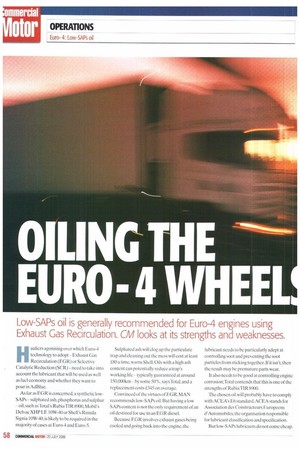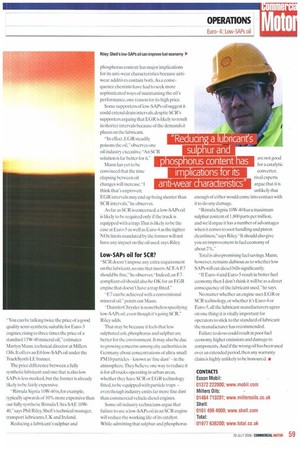EuRo. 4 WHEEL
Page 58

Page 59

If you've noticed an error in this article please click here to report it so we can fix it.
Low-SAPs oil is generally recommended for Euro-4 engines using
Exhaust Gas Recirculation. CM looks at its strengths and weaknesses.
Hauliers agonising over which Euro-4 technology to adopt — Exhaust Gas Recirculation (EGR) or Selective Catalytic Reduction (SCR) —need to take into account the lubricant that will be used as well as fuel economy and whether they want to pour in AdIFIlue.
As far as EGR is concerned, a synthetic lowSAPs — sulphated ash, phosphorus and sulphur — oil,such asTotal's Rubia TIR 8900, Mobil's Delvac XHP LE 10W-40 or Shell's Rimula Signia 10W-40,is likely to be required in the majority of cases at Euro-4 and Euro-5. Sulphated ash will clog up the particulate trap and cleaning out the mess will cost at least /SO a time, warns Shell. Oils with a high ash content can potentially reduce a trap's working life — typically guaranteed at around 150,000km — by some 50%. saysTotal, and a replacement costs 045 on average.
Convinced of the virtues of EGR, MAN recommends low-SAPs oil. But having a low SAPS content is not the only requirement of an oil destined for use in an EGR diesel.
Because EGR involves exhaust gases being cooled and going back into the engine, the lubricant needs to be particularly adept at controlling soot and preventing the soot particles from sticking together. If it isn't, then the result may be premature parts wear.
It also needs to be good at controlling engine corrosion;Total contends that this is one of the strengths of Ruhia TIR 8900.
The chosen oil will probably have to comply with ACEA's E6 standard.ACEA stands for Association des Constructeurs Europeens d'Automobiles. the organisation responsible for lubricant classification and specification.
But low-SAPs lubricants do not come cheap. "You can be talking twice the price of a good quality semi-synthetic suitable for Euro-3 engines, rising to three times the price of a standard 15W-40 mineral oil," estimates Martyn Mann, technical director at Millers Oils. It offers an E6 low-SAPs oil under the TruckSynth LE banner.
The price difference between a fully synthetic lubricant and one that is also low SAPs is less marked, but the former is already likely to be fairly expensive.
"Rimula Signia 10W-40 is, for example, typically upwards of 10% more expensive than our fully synthetic Rimula Ultra SAE 10W40," says Phil Riley, Shell's technical manager, transport lubricants, UK and Ireland.
Reducing a lubricant's sulphur and phosphorus content has major implications for its anti-wear characteristics because antiwear additives contain both. As a consequence chemists have had to seek more sophisticated ways of maintaining the oil's performance, one reason for its high price.
Some supporters of low-SAPs oil suggest it could extend drain intervals, despite SCR's supporters arguing that EGR is likely to result in shorter intervals because of the demands it places on the lubricant.
"In effect, EGR steadily poisons the oil," observes one oil industry executive. "An SCR solution is far better for it."
Mann has yet to be convinced that the time elapsing between oil changes will increase. "I think that's unproven; EGR intervals may end up being shorter than SCR intervals," he observes.
As far as SCR is concerned, a low-SAPs oil is likely to be required only if the truck is equipped with a trapThat is likely to be the case at Euro-5 as well as Euro-4 as the tighter NOx limits mandated by the former will not have any impact on the oil used, says Riley.
Low-SAPs oil for SCR?
"SCR doesn't impose any extra requirement on the lubricant, so one that meets ACEA F7 should be fine," he observes. Indeed, an E7compliant oil should also be OK for an EGR engine that doesn't have a trap fitted."
"E7 can be achieved with a conventional mineral oil." points out Mann.
"DaimlerChrysler is nonetheless specifying low-SAPs oil, even though it's going SCR," Riley adds.
That may be because it feels that less sulphated ash, phosphorus and sulphur are better for the environment. It may also he due to growing concerns among city authorities in Germany about concentrations of ultra-small PMI0 particles— known as 'fine dust' in the atmosphere.They believe one way to reduce it is for all trucks operating in urban areas, whether they have SCR or EGR technology fitted, to be equipped with particle traps — even though industry emits far more fine dust than commercial vehicle diesel engines.
Some oil industry technicians argue that failure to use a low-SAPs oil in an SCR engine will reduce the working life of its catalyst. While admitting that sulphur and phosphorus are not good for a catalytic converter, rival experts argue that it is unlikely that enough of either would come into contact with it to do any damage.
"Rimula Signial OW-40 has a maximum sulphur content of 1,8(X)parts per million, and we'd argue it has a number of advantages when it comes to soot handling and piston cleanliness," says Riley. "11 should also give. you an improvement in fuel economy of about 2%."
os orus content as im ications for its
Total is also promising fuel savings. Mann, however, remains dubious as to whether low SAPs will cut diesel bills significantly.
If Euro-4 and Euro-5 result in better fuel economy then I don't think it will be as a direct consequence of the lubricant used," he says.
No matter whether an engine uses EGR or SCR technology, or whether it's Euro-4 or Euro-5, all the lubricant manufacturers agree on one thing: it is vitally important for operators to stick to the standard of lubricant the manufacturer has recommended.
Failure to do so could result in poor fuel economy, higher emissions and damage to components And if the wrong oil has been used over an extended period, then any warranty claim is highly unlikely to be honoured. in CONTACTS Exxon 01372 222000; www.mobil.com Millers Oils: • 01484 713201; www.millersoils.co.uk Shell: 0161 4994000; www.shell.corn Total: 01977 636200; www.total.co.uk
























































































































































































